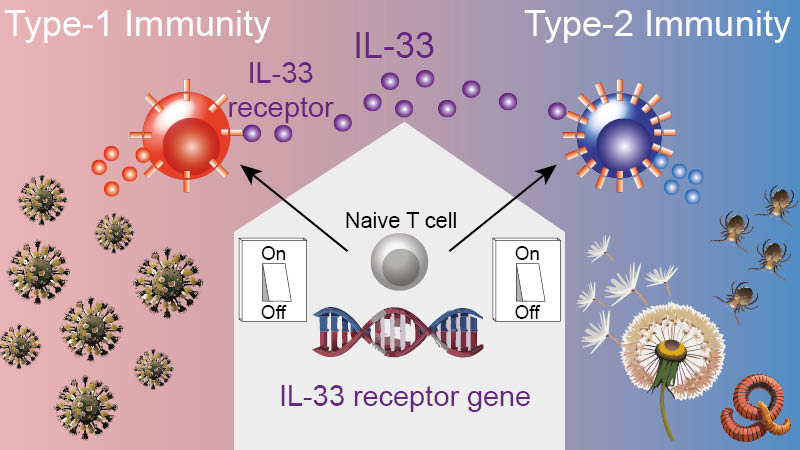Genetic switch for immune responses against viruses discovered

A research team from the German Rheumatism Research Centre Berlin (DRFZ), a Leibniz Institute, and the Charité – Universitätsmedizin Berlin has discovered a previously unknown gene region that is crucial for the regulation of the body’s defense against viruses, but is presumably also of substantial importance in autoimmune diseases. These data have now been published in the renowned scientific journal Nature Immunology.
The cells of the type 1 immune response, such as cytotoxic T cells or T helper 1 cells, are essential for effectively defeating viruses and cancer. However, these cells also exacerbate many autoimmune diseases. Type 2 immune cells, on the other hand, are responsible for defense against parasites and for wound healing processes, but they can also promote allergies. Both type 1 and type 2 immune cells need the body’s own alarm signals in order to be activated. One example of such an alarm signal is interleukin-33, which is released by dying cells, for example during infections. Until now, it was unclear how sensing of interleukin-33 alarm signals is controlled in type 1 immune cells.
Prof Max Löhning’s research team has now identified a previously unknown regulatory gene region. It controls the production of the receptor for interleukin-33 specifically in cells of the type 1 immune response. In contrast to type 2 immune cells, which can always recognize interleukin-33 signals, this gene region enables cells of the type 1 immune response to react to alarm signals only temporarily in acute emergencies, such as a viral infection. Dr Tobias Brunner and Sebastian Serve, first authors of the study, assume: “This evolutionarily conserved, cell type-specific regulation of the interleukin-33 receptor is probably necessary to prevent type 1 immune cells from being activated inappropriately and then causing unwanted inflammation and autoimmune diseases”.
The research team used CRISPR/Cas9 gene scissors to cut out the newly identified gene region from the mouse genome. Type 1 immune cells in these mice were then no longer able to recognize interleukin-33 alarm signals well, which severely weakened the T cell response against viruses. Type 2 immune cells, however, remained unaffected.
Max Löhning and Tobias Brunner, leader of the study, emphasize: “The discovery of this genetic switch now opens up new therapeutic possibilities for specifically influencing the activity of either type 1 or type 2 immune responses without simultaneously weakening the other form of immune response. This could help to develop customized treatments for unwanted inflammatory reactions, such as those that occur in allergies or autoimmune diseases”.
